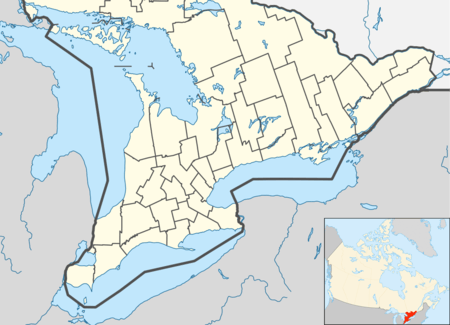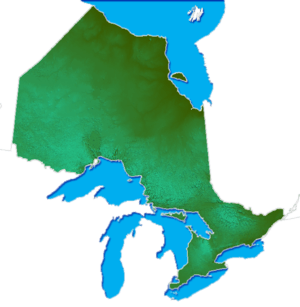Rondeau Provincial Park
| Rondeau Provincial Park | |
|---|---|
|
IUCN category II (national park) | |
|
Rondeau in Spring | |
 | |
| Nearest city | Chatham, Ontario |
| Coordinates | 42°17′N 81°52′W / 42.283°N 81.867°WCoordinates: 42°17′N 81°52′W / 42.283°N 81.867°W |
| Area | 32.54 km2 (12.56 sq mi) |
| Established | 1894 |
| Governing body | Ontario Parks |
Rondeau Provincial Park, located in southwestern Ontario, Canada is the second oldest provincial park having been established with an order in council on 8 September 1894.[1] The park is located on an 8 km long crescentic sand spit extending into Lake Erie. In a 1930 soil survey most of the spit was mapped as Berrien sand, which is imperfectly drained.[2] There are only two sand spits like this one in all of North America, one in Rondeau and one in Florida. Rondeau was established in 1894 as a response to demand for cottaging opportunities by residents of nearby Chatham. It is the second-oldest provincial park in Ontario (after Algonquin Provincial Park). It is recognized as the largest tourist destination in the Municipality of Chatham-Kent. Rondeau is also home to the largest area of Carolinian forest in Canada, a long sand beach, a large marsh, approximately half of Rondeau Bay, campgrounds and a cottage community. Most of the park is natural environment; the cottage community takes up less than 1% of the Park area and is practically invisible from the air. The name of the park comes from the French words "ronde eau" or "round water" which describes the shape of the harbour sheltered by the peninsula.
The park is an important stopover for birds during migration and has been identified as a Canadian Important Bird Area. Its Carolinian woods also provide nesting habitat for the Prothonotary Warbler and many other Carolinian species. Limited hunting of White-tailed Deer has been permitted within the park to control deer numbers because these animals no longer have any natural predators, and pose a threat to the park's forested areas. Waterfowl hunting is permitted in the park area in the fall.
"Government Dock" on Rondeau Bay
The park's signature landmark has always been the Government Dock on Rondeau Bay. The original Government Dock was built in 1895, the year after the park was chartered. It survived until 1907 when it was destroyed by a storm. The second dock was built in 1909 and it remained in place until 1954 when it was rebuilt & lengthened to go farther out into deeper water. This dock remained until 1971 when it was completely rebuilt as a 420' x 16' structure. Cost of construction was $50,000. The 1971 Government Dock remained in active use until February 28, 2014 when it was destroyed by a demolition crew hired by Ontario Parks.
According to MNR Press Releases the dock was a victim of an unusually harsh winter. One theory is that the thick bay ice hugged its support braces tightly and when the ice floated up under hydraulic pressure it pulled the pilings up with it. That allowed the shifting ice to move a section northward, giving it a noticeable bend near the ’T’ at the end. On January 15th the dock was “temporarily” cordoned-off pending an Engineer’s Report on the options for fixing it. Then six weeks later demolition began using heavy equipment driven out onto the ice. And a week after that the Government Dock was gone from Rondeau Bay forever.
On March 14th a Ridgetown-area family started an online petition asking former Superintendent Rick Post to please replace the dock. On March 25th the Chatham Daily News reported on the petition. An MNR spokesperson said that nothing was yet decided — and the Engineer’s Report hadn’t been completed. Note that by then the dock had already been gone for nearly a month.
On April 3rd Chatham-Kent Essex MPP Rick Nicholls raised the issue of replacing the Government Dock during Question Period in the Legislature.
On May 17th MPP Nicholls stated that he was unable to obtain a copy of the Engineers Report justifying the demolition of the structure.
On June 4th an MNR spokesperson gave this statement to the local newsmedia: “There was an engineering firm that was doing an assessment. They’ve now completed the assessment and the rehab options and we’re reviewing the report. We have to keep it closed because it’s a safety risk, but then we have to take time to consider our options. We will be looking at a number of things as we review the report. Factors under consideration are things like recreational opportunities, species at risk and cost effectiveness.” At this point the dock had been gone for 96 days.
The estimated cost to rebuild the structure is $600,000 to $750,000. As a provincially owned structure over 40 years of age, it was covered by the Standards & Guidelines for Protection of Provincial Heritage Properties and should have had a Cultural Heritage assessment done by a qualified assessor prior to demolition. There is no indication that this assessment was ever completed by Ontario Parks.
Rondeau Yacht Club
The Rondeau Yacht Club was founded in 1932. In 2007 as part of the club's 75th anniversary celebrations, Martha Crow Ciupa & Bob Ciupa wrote 'Rondeau Yacht Club : the first 75 years, 1932 to 2007'.[3] Today, Rondeau Yacht Club operates during July & August teaching sailing, windsurfing, canoeing, and swimming to area children. The Land Use Permit for the Rondeau Yacht Club is to be renewed annually through 2017, at which point Ontario Parks expects the 85-year-old facility to be demolished.
One of Ontario's first publicly accessible Defibrillators is located at the Rondeau Yacht Club. The device was donated and is maintained by the Rondeau Cottagers Association.
Rondeau's Cottage Community
In the Ontario Parks system, Rondeau, Algonquin and McGregor Point continue the tradition of privately owned cottages on leased land. Rondeau is unique in that Section 5b of the 1894 Rondeau Park Act states that Rondeau Park was created specifically to provide cottaging opportunities for area residents. Forty cottage lots were surveyed at the outset. Several other provincial parks (Kawartha Highlands, Killarney, Presqu'ile, Sandbanks) have privately owned cottages within their boundaries on lots deeded to the cottage owners. Other provincial parks have cottages that are owned by the Ministry of Natural Resources and rented (Awenda, Balsam lake, Bon Echo, Bonnechere, Pinery, Sandbanks, Sleeping Giant and Sturgeon Bay).
As of September 2014 there are 283 family-owned cottages in Rondeau Park. The oldest cottages were built over 100 years ago; most were built in the 1920s. The cottage community has been assessed as a Cultural Heritage Landscape of provincial significance. The MNR Statement of Philosophy of Integrated Resource Management (Feb. 1985) contains the following statement: "Multiple Use Policy is not consistent with a province-wide policy of restricting cottage leases in provincial parks. Instead, planning policy in specific parks should be based on the values, traditions and classification of each park." Rondeau is a Natural Environment -class park, but the cottages are recognized in the official Park Management Plan as Cultural Heritage assets. This requires that the cottages be protected under the Provincial Parks & Conservation Reserves Act, the Class Environmental Assessment for parks and the Ontario Heritage Act. Nevertheless, all current private leases expire on December 31, 2017, at which time the MNR expects all 283 cottages and the Rondeau Yacht Club will be demolished at the owners' expense.
The Heritage Board of Chatham-Kent has expressed concern over the possible loss of the cottage community. On August 11, 2014 Chatham-Kent Council voted unanimously to have Rondeau's cottage community placed on the municipality's Heritage Register as a first step towards permanent protection.
The Rondeau Cottagers Association and the Municipality of Chatham-Kent (with the support of Chatham-Kent Essex Conservative MPP Rick Nicholls) have been lobbying the provincial government to give the cottage community permanent tenure.
References
- ↑ Killan, Gerald (1993). Protected Places: A History of Ontario's Provincial Parks System. Dundurn Press Ltd. pp. 18–20. ISBN 9781550021806. Retrieved 3 July 2012.
- ↑ http://sis.agr.gc.ca/cansis/publications/surveys/on/on3/index.html
- ↑ Martha Crow Ciupa & Bob Ciupa 'Rondeau Yacht Club : the first 75 years, 1932 to 2007. (Niagara Falls, Ont. All Things Nautical, 2007).
External links
| ||||||||||||||||||||||||||||
